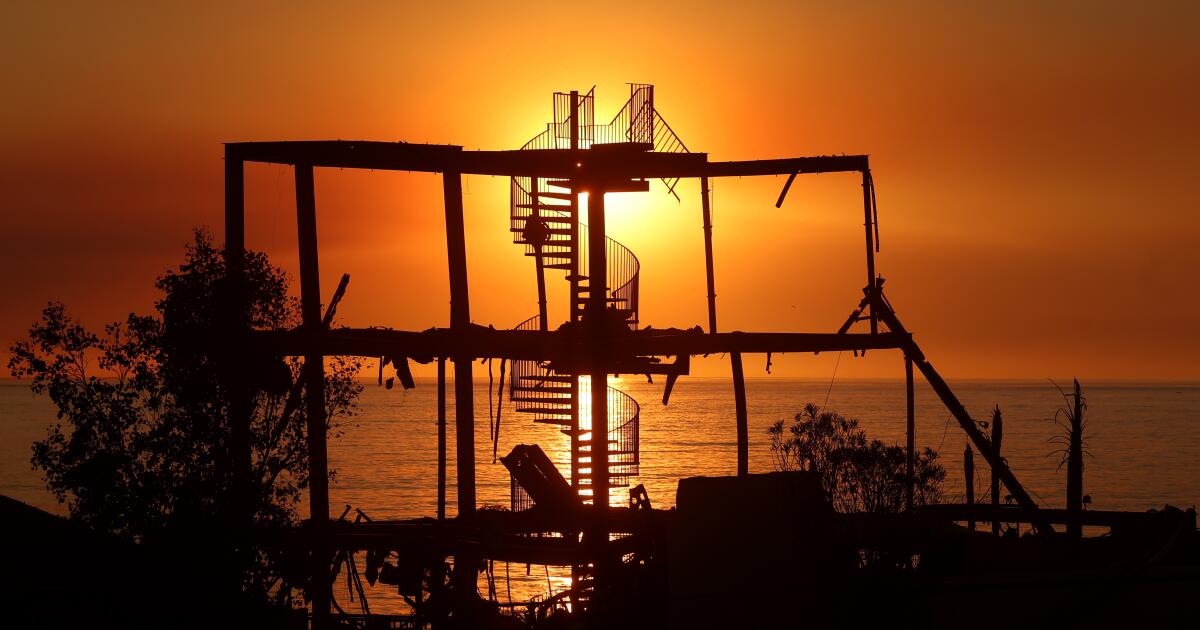Paradise Lost Along Pacific Coast Highway
A Calamitous Geography
Wildfires are supposed to be in the hills — in the wild — not on the beach, and certainly not inside the borders of one of the biggest and best-prepared cities on the planet.
The devastation from the Palisades fire extends for miles along Pacific Coast Highway.
But the fire that tore through coastal urban Pacific Palisades this week was driven by the kind of unholy wind speeds typically confined to high mountain passes or the crest of the Sierra Nevada. Astonishing gusts of 70 to 80 mph blew all of those preconceived notions away.
A Fire Out of Control
“I never thought we’d have to evacuate, because we’re so far away from the mountains,” said Denise Weaver, who lives on a bluff overlooking dozens of burned houses on the Pacific Coast Highway. She struggled to find words to describe the tragedy, and the irony, of friends losing everything to fire on the edge of the world’s largest water source.
“We’re, like, 100 feet from the Pacific Ocean,” Weaver said. “It’s just nuts.”
What amounted to a flaming hurricane erased all of the presumed safety advantages of fighting a fire in a well-equipped city.
The small air force of nearby tanker planes and helicopters was grounded. Powerful streams of water from a veritable traffic jam of firetrucks were snatched by the wind and carried away as mist. And with so much sudden demand on the city’s water system, hydrants quickly ran dry.
A Scene of Devastation
By Thursday, neighborhoods still smoldered for miles up and down the Pacific Coast Highway, more than 5,000 homes and businesses scorched. Residents, desperate to see what had become of their homes, argued with cops who had been ordered to keep people out of the evacuation zone.
It was a scene reminiscent of the aftermaths of so many other tragic fires — the Camp fire in Butte County in 2018, the Lahaina fire on Maui in 2023 — but this time the landscape seems oddly familiar, even for people who have never actually been to the Palisades.
A Slow, Sad Drive
A slow, sad drive up the coast on Thursday revealed so much of that familiar territory reduced to ashen ruins.
The ruins of beachfront homes smolder along the Pacific Ocean.
Remember Moonshadows, the restaurant perched over the Pacific where Mel Gibson got drunk in 2006 and launched into a nearly career-ending anti-Jewish tirade when police pulled him over just down the road?
Gone.
So is Gibson’s $14-million house in Malibu, burned while he was in Austin, Texas, doing Joe Rogan’s podcast. “Well, at least I haven’t got any of those pesky plumbing problems anymore,” he quipped to the Hollywood Reporter.
A Community in Mourning
Paul Austin, 61, is an orthodontist. He’d left at 6 a.m. Tuesday to go to his office in Simi Valley and straighten a few teeth. While he was gone, his home of 20 years and almost everything in it was “totally, totally destroyed,” he said. He hadn’t changed clothes in three days.
He started the interview joking that the only thing left on his property is a giant Santa in his frontyard, a holdover Christmas decoration that he thought for sure would have blown away.
“I don’t think for any of us, really, it’s even hit home what we’ve lost,” he said, and then he paused, overcome by sudden sobs behind his mask and his goggles.
“Everything.”
Conclusion
The devastation caused by the Palisades fire is a stark reminder of the unpredictable nature of wildfires and the importance of being prepared. As the community begins the long process of rebuilding and recovery, it is clear that the impact of this disaster will be felt for a long time to come.
FAQs
Q: What caused the Palisades fire?
A: The fire was caused by strong winds and dry conditions.
Q: How many homes were destroyed in the fire?
A: More than 5,000 homes and businesses were scorched.
Q: What is the current situation in the affected area?
A: The area is still smoldering, and residents are being kept out of the evacuation zone.
Q: What is being done to help those affected by the fire?
A: Emergency services are on the ground, and aid is being provided to those who have lost their homes and belongings.


